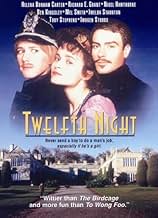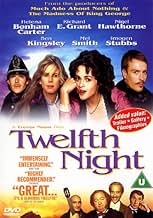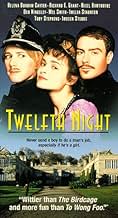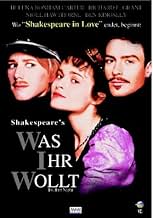CALIFICACIÓN DE IMDb
7.1/10
6.6 k
TU CALIFICACIÓN
Adaptación de la obra de Shakespeare que cuenta la historia de dos hermanos separados tras un naufragio, cada uno creyendo que el otro ha muerto.Adaptación de la obra de Shakespeare que cuenta la historia de dos hermanos separados tras un naufragio, cada uno creyendo que el otro ha muerto.Adaptación de la obra de Shakespeare que cuenta la historia de dos hermanos separados tras un naufragio, cada uno creyendo que el otro ha muerto.
- Dirección
- Guionistas
- Elenco
- Premios
- 1 premio ganado y 2 nominaciones en total
Sidney Livingstone
- Captain
- (as Sid Livingstone)
David Burke
- Party Guest
- (sin créditos)
- …
- Dirección
- Guionistas
- Todo el elenco y el equipo
- Producción, taquilla y más en IMDbPro
Opiniones destacadas
As with most Shakespearian comedies, the plot is deeply implausible. However, the excellent Cornish locations at St Michael's Mount & Lanhyrock give a good sense of place and the winter setting (apart from the scene of apple picking!) comes across well - it really does look like an English winter, rather than a picture postcard snow-scene.
The play is cut down to a manageable length without losing the sense of it, The broad comedy aspects (Toby Belch et al) are thankfully limited.
The acting is well done by a cast of British stalwarts. Amazingly, Viola and Sebastian actually do look broadly alike.
This film is best viewed as an amusing light romantic comedy rather than a side-splitter.
The play is cut down to a manageable length without losing the sense of it, The broad comedy aspects (Toby Belch et al) are thankfully limited.
The acting is well done by a cast of British stalwarts. Amazingly, Viola and Sebastian actually do look broadly alike.
This film is best viewed as an amusing light romantic comedy rather than a side-splitter.
In writing Twelfth Night (and the same goes for many other of his romantic comedies), Shakespeare showed that he was not only a genius at dark tragedy but also at light comedy. I saw a junior college production of this play which did live up to Shakespeare's intentions, which was in fact so funny I was falling off my chair.
Unfortunately, director Nunn will not allow a hilarious slapstick comedy to just be a hilarious slapstick comedy. Apparently he succumbed to the notion that everything Shakespearean has somehow to seem profound, which in this case results in an attempt to transfer this light, sparkling comedy, full of deliberately overdrawn characters and silly lines and pratfalls, into a brooding tragedy in which pompous ass Malvolio acts as if he were, or imagined himself to be, Hamlet caught in the wrong play, while clown Feste is misanthropic to the point of sadism. There is no suggestion of comic timing anywhere in this film!
It appears that once Nunn decided to insist on a modern-dress version, he adopted as his mentor the let's-portray-the-messed-up-dysfunctional-household school. This is stupid. A better mentor would have been a closer modern equivalent of what Shakespeare was doing in this play. Something like I Love Lucy or Amos 'n' Andy or The Honeymooners, in other words.
One thing that entirely puzzles me is: why the devil didn't Nunn exploit the particular advantages of the cinema in depicting this gender-bender story of a girl impersonating a look-alike boy? Why in sam hill didn't Nunn have a male actor who is skilled at female impersonation, or an actress skilled at impersonating males, play both roles on a split screen? (See, for the sort of impersonation I refer to, Vanessa Redgrave as the trans-sexual tennis player in Second Serve.) In other words: Why transform a stage play into a film at all, if you're not going to put the advantages of the cinema, as opposed to those of the stage, to work? Nunn's treatment of this play is not only a mangled interpretation, it's unimaginative.
Ben Kingsley is the only performer who does very much with his part, and what he does he does very well. His acting creates a very interesting character, and his interpretation of Feste is certainly consistent, but it receives no support whatsoever from the text.
Unfortunately, director Nunn will not allow a hilarious slapstick comedy to just be a hilarious slapstick comedy. Apparently he succumbed to the notion that everything Shakespearean has somehow to seem profound, which in this case results in an attempt to transfer this light, sparkling comedy, full of deliberately overdrawn characters and silly lines and pratfalls, into a brooding tragedy in which pompous ass Malvolio acts as if he were, or imagined himself to be, Hamlet caught in the wrong play, while clown Feste is misanthropic to the point of sadism. There is no suggestion of comic timing anywhere in this film!
It appears that once Nunn decided to insist on a modern-dress version, he adopted as his mentor the let's-portray-the-messed-up-dysfunctional-household school. This is stupid. A better mentor would have been a closer modern equivalent of what Shakespeare was doing in this play. Something like I Love Lucy or Amos 'n' Andy or The Honeymooners, in other words.
One thing that entirely puzzles me is: why the devil didn't Nunn exploit the particular advantages of the cinema in depicting this gender-bender story of a girl impersonating a look-alike boy? Why in sam hill didn't Nunn have a male actor who is skilled at female impersonation, or an actress skilled at impersonating males, play both roles on a split screen? (See, for the sort of impersonation I refer to, Vanessa Redgrave as the trans-sexual tennis player in Second Serve.) In other words: Why transform a stage play into a film at all, if you're not going to put the advantages of the cinema, as opposed to those of the stage, to work? Nunn's treatment of this play is not only a mangled interpretation, it's unimaginative.
Ben Kingsley is the only performer who does very much with his part, and what he does he does very well. His acting creates a very interesting character, and his interpretation of Feste is certainly consistent, but it receives no support whatsoever from the text.
Reading Trevor Nunn's thoughts on his film, it is easy to conclude that they were lucky to obtain such sublime weather for the large duration of the filming, in November. The Cornwall locations are absolutely enchanting; showing an England so far from the urban norm these days. The beautiful natural light, with later dark contrasts, perfectly complements the jovial, winning mood of this Shakespeare comedy brought to screen: and, what is more, this is truly beyond any sense of 'heritage cinema', as Shakespeare's genius is retained.
Yes, it is all a very 'accessible' package, but much is unusual and distinctive to this film adaptation. Ben Kinglsey is perhaps the most glaring instance of a radical re-invisioning; his acting - stripped bare of artifice - is utterly compelling and keeps you watching his every mannerism. This Feste is an eccentric, multi-talented clown and performer, but he also bears words of cutting, melancholy truth. Indeed, both are wonderfully combined with the gorgeously sad scene of Staunton, Grant and Smith listening to his sad song: they listen and the words cut into their veneers. Loneliness is at their very core. What a brilliantly rounded comedy this is; balanced by melancholy - the inch-perfect awry note struck by Hawthorne's Malvolio appearing at the end - and good will - the comradely bonhomie that Grant and Smith are indeed shown to share.
Hawthorne and perhaps more surprisingly Mel Smith and Richard E. Grant really do a fine job and imbuing some real character in their parts; treading a line between broad comedic playing and human sadness. Along with Kingsley's career-best (? not seen too many of his films) performance, they lend this film its heart, and play very well against the wonderful settings. Mackintosh and Stubbs are I guess a little less compelling, but these roles are really difficult to carry off... nothing about them really lingers too long in the memory, like Kingsley's expressions, bizarre little pieces of dance and his pared-down delivery. Helena Bonham Carter is perhaps overly assured as the vain countess dame, Olivia: oh so archly bemused when faced by the cross-gartered, prancing Hawthorne, but generally Ms. Bonham Carter is very much in her usual, predictably petulant, period-costume mode. Which is probably being unfair; she does convince, at the end of the day.
Overall then, a wonderfully colourful delight, bearing the flavour of bright, melancholy late summer-into-autumn. A strange chill is cast by the compelling Kinglsey; a sadness that cannot be dispelled. This film has light amusement in addition to this real edge, and is ultimately a very affecting rendering of a bona fide Shakesperean classic.
Yes, it is all a very 'accessible' package, but much is unusual and distinctive to this film adaptation. Ben Kinglsey is perhaps the most glaring instance of a radical re-invisioning; his acting - stripped bare of artifice - is utterly compelling and keeps you watching his every mannerism. This Feste is an eccentric, multi-talented clown and performer, but he also bears words of cutting, melancholy truth. Indeed, both are wonderfully combined with the gorgeously sad scene of Staunton, Grant and Smith listening to his sad song: they listen and the words cut into their veneers. Loneliness is at their very core. What a brilliantly rounded comedy this is; balanced by melancholy - the inch-perfect awry note struck by Hawthorne's Malvolio appearing at the end - and good will - the comradely bonhomie that Grant and Smith are indeed shown to share.
Hawthorne and perhaps more surprisingly Mel Smith and Richard E. Grant really do a fine job and imbuing some real character in their parts; treading a line between broad comedic playing and human sadness. Along with Kingsley's career-best (? not seen too many of his films) performance, they lend this film its heart, and play very well against the wonderful settings. Mackintosh and Stubbs are I guess a little less compelling, but these roles are really difficult to carry off... nothing about them really lingers too long in the memory, like Kingsley's expressions, bizarre little pieces of dance and his pared-down delivery. Helena Bonham Carter is perhaps overly assured as the vain countess dame, Olivia: oh so archly bemused when faced by the cross-gartered, prancing Hawthorne, but generally Ms. Bonham Carter is very much in her usual, predictably petulant, period-costume mode. Which is probably being unfair; she does convince, at the end of the day.
Overall then, a wonderfully colourful delight, bearing the flavour of bright, melancholy late summer-into-autumn. A strange chill is cast by the compelling Kinglsey; a sadness that cannot be dispelled. This film has light amusement in addition to this real edge, and is ultimately a very affecting rendering of a bona fide Shakesperean classic.
Slick Shakespeare adaptation, well acted and very humorous (in parts) in its telling. Naturally, there's always going to be some differences from stage to cinema. The film took advantage of this, of course, to avoid a "stage" feel. The perceptions, or rather the misperceptions, of people and motivations are well explored and portrayed. Ben Kingsley is a standout, for his interesting twist on the character Feste. In short, a good adaptation and film. Recommended.
¿Sabías que…?
- TriviaIn the mid 1950s, director Joseph L. Mankiewicz tried to set up a version with Audrey Hepburn and Danny Kaye, but it failed to materialize.
- ErroresFeste's guitar playing for Cesario (Viola) and Orsino does not match up with the soundtrack.
Selecciones populares
Inicia sesión para calificar y agrega a la lista de videos para obtener recomendaciones personalizadas
- How long is Twelfth Night?Con tecnología de Alexa
Detalles
- Fecha de lanzamiento
- Países de origen
- Sitio oficial
- Idioma
- También se conoce como
- Twelfth Night
- Locaciones de filmación
- Lanhydrock House, Bodmin, Cornwall, Inglaterra, Reino Unido(Olivia's house and garden)
- Productoras
- Ver más créditos de la compañía en IMDbPro
Taquilla
- Presupuesto
- USD 5,000,000 (estimado)
- Total en EE. UU. y Canadá
- USD 588,621
- Fin de semana de estreno en EE. UU. y Canadá
- USD 33,451
- 27 oct 1996
- Total a nivel mundial
- USD 588,621
Contribuir a esta página
Sugiere una edición o agrega el contenido que falta




































